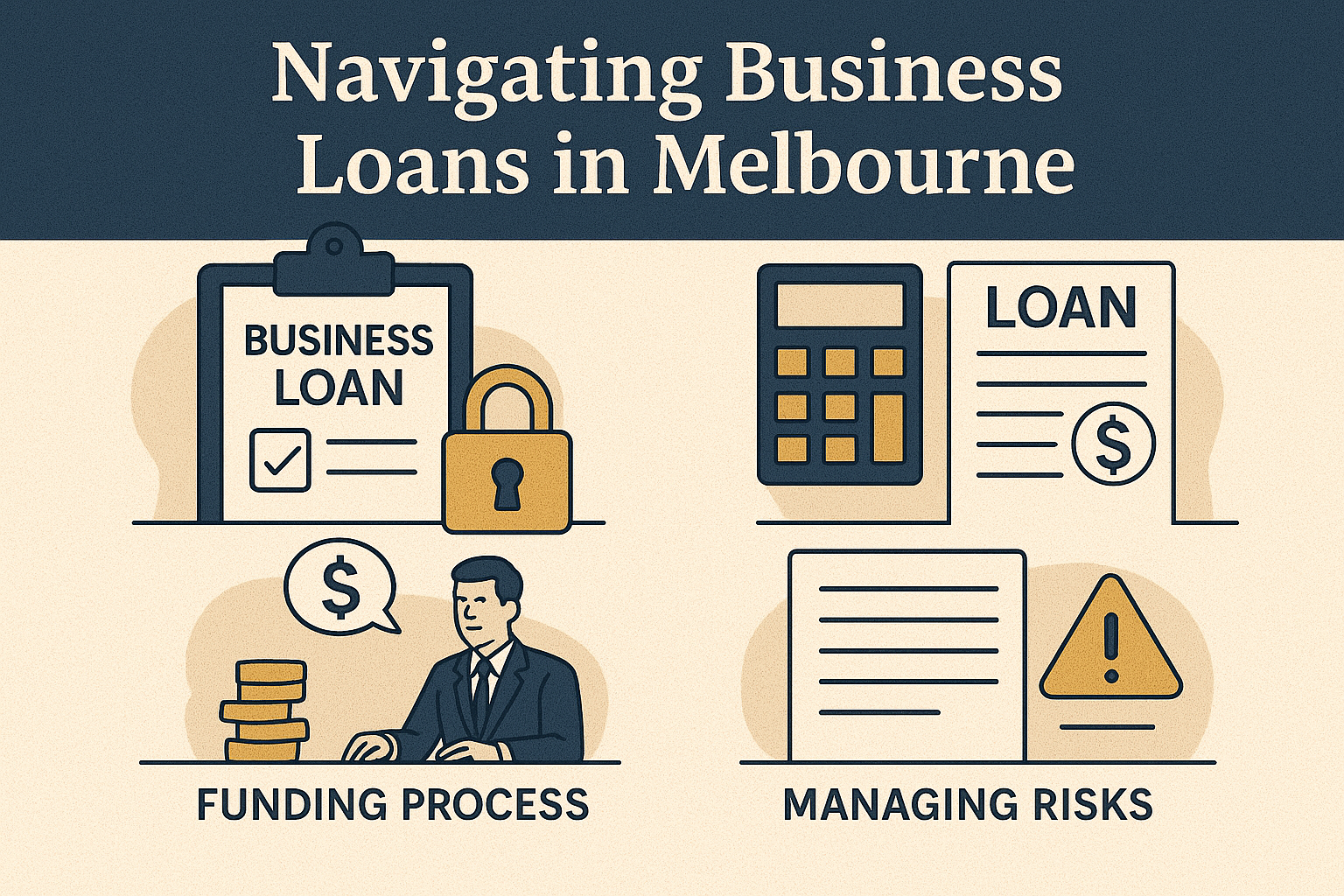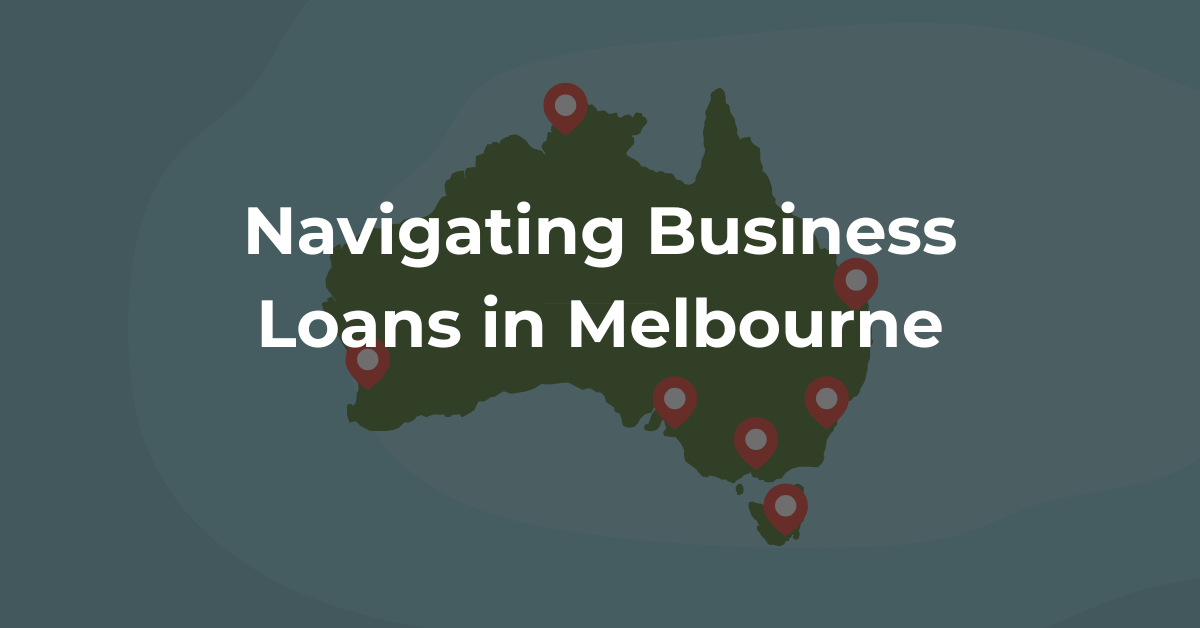Navigating the world of business loans can feel overwhelming for small business owners in Melbourne, but understanding your options is key to securing the right financing for your needs.
Whether you’re looking for secured business loans backed by assets or unsecured business loans that don’t require collateral, knowing the differences can help you make an informed decision.
As you explore business financing options in Melbourne, it’s essential to familiarize yourself with current business loan rates and the specific requirements that may apply.
In this guide, we’ll break down the process to apply for a business loan and offer insights into choosing the best option to promote growth and stability for your business. With the proper knowledge, you can confidently take steps toward achieving your business goals.
Note: You can get your free PDF guide on tips for getting a business loan below.
Understanding Business Loans
Business loans are a vital tool for Melbourne entrepreneurs looking to grow their ventures. Let’s explore the various types of loans, the distinction between secured and unsecured options, and how business loan rates are determined.
Types of Business Loans
Business loans come in various forms to suit different needs. Term loans provide a lump sum that is repaid over a set period, making them ideal for significant investments. Lines of credit provide flexible access to funds, making them suitable for managing cash flow.
Equipment financing enables businesses to acquire the necessary machinery or technology. Invoice financing allows companies to borrow against unpaid invoices, thereby improving their short-term cash flow.
Merchant cash advances provide quick funding based on future credit card sales, though they often come with higher costs. Each type of loan serves a specific purpose, so it’s crucial to match the loan to your business needs.
Note: You can get your free PDF guide on tips for getting a business loan below.

Secured vs. Unsecured Loans
Secured business loans require collateral, such as property or equipment. These loans often offer lower interest rates and higher borrowing limits because the lender has a form of guarantee.
Unsecured business loans don’t require collateral but typically have higher interest rates. They’re based on the borrower’s creditworthiness and business performance. These loans are often faster to obtain but may have stricter eligibility criteria.
The choice between secured and unsecured loans depends on your assets, risk tolerance, and funding needs. Consider the trade-offs carefully before deciding.
Business Loan Rates Explained
Business loan rates determine the cost of borrowing and can significantly impact your repayment amount. Fixed rates remain constant throughout the loan term, offering predictable payments. Variable rates can fluctuate based on market conditions, potentially resulting in lower initial payments but less certainty.
Factors affecting rates include your credit score, business history, and the type of loan. Secured loans typically offer lower interest rates than unsecured ones, as they involve reduced lender risk.
When comparing loans, look beyond the interest rate. Consider the annual percentage rate (APR), which includes fees and gives a more accurate picture of the total cost of borrowing.
Melbourne Business Financing Options
Melbourne offers a diverse range of financing options for businesses. From traditional banks to innovative online lenders and government programs, there’s likely a solution that fits your needs.
Local Banks and Credit Unions
Local banks and credit unions in Melbourne offer personalized service and a deep understanding of the local business environment. These institutions often provide competitive rates for business loans and may be more flexible with terms.
Many local banks offer relationship-based banking, where maintaining multiple accounts or a long-standing relationship can result in more favorable loan terms. They may also provide valuable advice and support beyond just lending.
Credit unions, being member-owned, often offer more favorable rates and terms compared to large banks. They’re excellent options for small businesses looking for community-focused lenders.
Online Lenders and Fintech Solutions
Online lenders and fintech companies have revolutionized business financing in Melbourne. These platforms often offer faster approval processes and more flexible criteria than traditional banks.
Many online lenders utilize alternative data points to assess creditworthiness, which can be particularly beneficial for businesses with limited credit histories. They may consider factors like cash flow, online reviews, and social media presence.
While online lenders can provide quick access to funds, it’s essential to review the terms and rates carefully. Some may offer higher interest rates or shorter repayment terms compared to traditional lenders.
Government Support Programs
The Australian government offers various support programs for small businesses in Melbourne. These include grants, low-interest loans, and guarantees designed to stimulate business growth and innovation.
To access these programs, businesses typically need to meet specific criteria and demonstrate how the funding will contribute to their growth or recovery. Visit the Business Victoria website for the latest information on current offerings and eligibility requirements.
Applying for Small Business Loans
Securing a small business loan in Melbourne requires careful preparation and understanding of lender requirements. Here’s how to navigate the application process effectively.
Preparing Your Application
A strong loan application starts with thorough preparation. Gather all necessary documents, including:
-
Business financial statements (balance sheet, profit and loss statement, cash flow statement)
-
Tax returns (both business and personal)
-
Bank statements
-
Business plan and financial projections
Ensure your business plan outlines how you’ll use the loan and how it will contribute to your business growth. This demonstrates to lenders that you have a solid repayment strategy.
Review your credit report and address any issues before applying for credit. A strong credit score can significantly improve your chances of approval and help secure better rates.
Meeting Business Loan Requirements
Each lender has specific requirements for business loans. Common criteria include:
-
Minimum time in business (usually 6 months to 2 years)
-
Minimum annual revenue
-
Acceptable credit score (both personal and business)
-
Debt-to-income ratio
Some lenders may require collateral for secured loans or a personal guarantee for unsecured loans. Understand these requirements before applying to ensure you’re targeting the right lenders for your situation.
Be prepared to explain any past financial challenges and how you’ve overcome them. Lenders appreciate transparency and evidence of financial responsibility.
Tips for a Successful Application
To increase your chances of approval:
-
Choose the right loan type for your needs
-
Apply to lenders that specialize in your industry or business size
-
Prepare a compelling case for why you need the loan and how it will benefit your business
-
Be realistic about how much you can afford to borrow and repay
-
Consider working with a financial advisor or accountant to strengthen your application
Remember, if one lender declines your application, don’t be discouraged. Each lender has different criteria, and you may find success with another.
Managing Loan Repayments
Effective management of loan repayments is crucial for maintaining financial health and building a strong credit profile for your business.
Budgeting for Repayment
Creating a budget for loan repayments is essential. Start by reviewing your cash flow to ensure you can comfortably meet repayment obligations. Consider seasonal fluctuations in your business when planning your operations.
Set up automatic payments to avoid late fees and potential damage to your credit score. Many lenders offer discounts for setting up auto-pay.
Build a buffer into your budget for unexpected expenses or revenue dips. This can help you avoid missing payments during challenging times.
Refinancing Options
Refinancing can be a wise strategy to manage your business loan more effectively. Consider refinancing if:
-
Your business credit has improved since the original loan
-
Interest rates have decreased
-
You want to consolidate multiple loans
-
You need to lower your monthly payments
Before refinancing, calculate the total cost including any fees to ensure it’s financially beneficial. Remember that extending the loan term may lower monthly payments but increase the total interest paid over time.
Avoiding Common Pitfalls
To maintain a healthy financial position:
-
Don’t overextend your business by taking on too much debt
-
Avoid using business loans for personal expenses
-
Keep detailed records of all loan-related documents and communications
-
Communicate proactively with your lender if you anticipate repayment difficulties
If you’re struggling with repayments, contact your lender immediately. Many offer hardship programs or may be willing to restructure your loan to help you through difficult periods.
Case Studies and Success Stories
Real-world examples can provide valuable insights into how Melbourne businesses have successfully used loans to grow and overcome challenges.
Success with Secured Business Loans
Case Study: Melbourne Cafe Expansion
A popular cafe in Melbourne’s CBD used a secured business loan to finance its expansion to a second location. Key points:
-
Loan amount: $250,000
-
Collateral: Existing cafe equipment and lease agreement
-
Term: 5 years
-
Use of funds: Leasehold improvements, equipment purchase, and working capital
The secured loan offered a lower interest rate, allowing the business to manage repayments comfortably while growing its customer base. Within two years, the new location was profitable, significantly increasing overall business revenue.
Overcoming Challenges with Unsecured Loans
Example: Tech Startup Funding Gap
A Melbourne-based tech startup faced a funding gap while waiting for its next round of venture capital. They opted for an unsecured business loan to bridge the gap. Key details:
-
Loan amount: $100,000
-
Term: 18 months
-
Use of funds: Product development and marketing
Despite higher interest rates, the unsecured loan provided quick access to capital without diluting equity. The startup successfully launched its product on schedule, attracting additional investment and repaying the loan ahead of schedule.
Real Stories from Melbourne Entrepreneurs
“The business loan we secured allowed us to invest in new equipment, increasing our production capacity by 50%. This growth led to new contracts and a 30% increase in annual revenue.” – Sarah, Manufacturing Business Owner.
“As a seasonal business, we used a line of credit to manage cash flow during slow periods. This flexibility helped us maintain steady growth year-round.” – Michael, Tourism Operator.
These stories illustrate how various loan types can cater to distinct business needs, ranging from expansion to cash flow management. The key is choosing the right financing option for your unique situation and using the funds strategically to drive growth.




